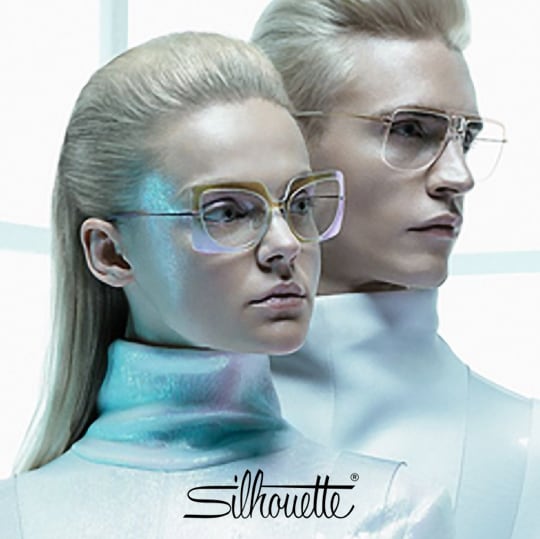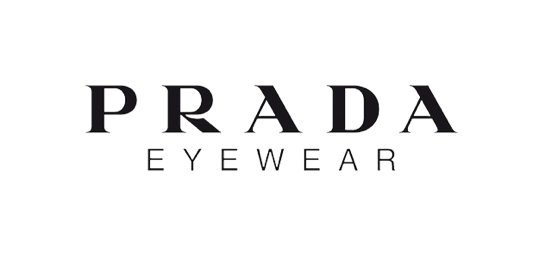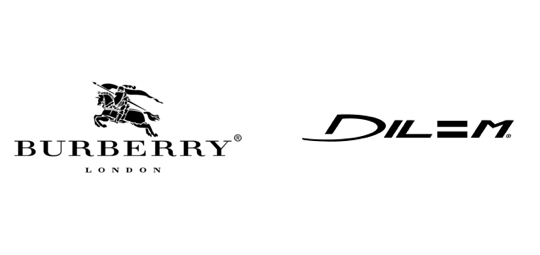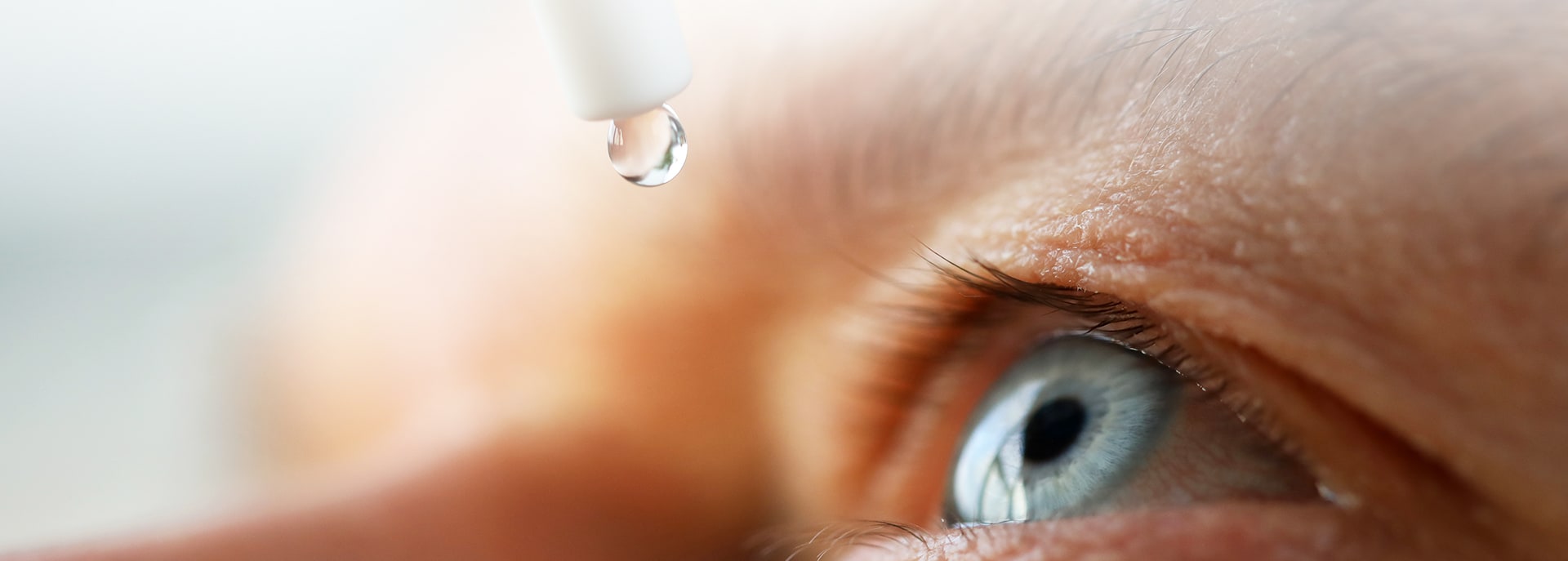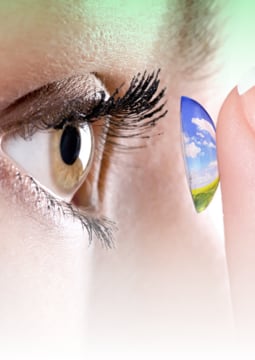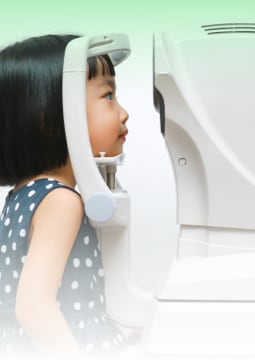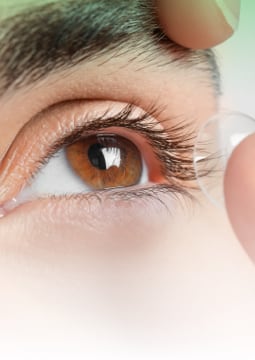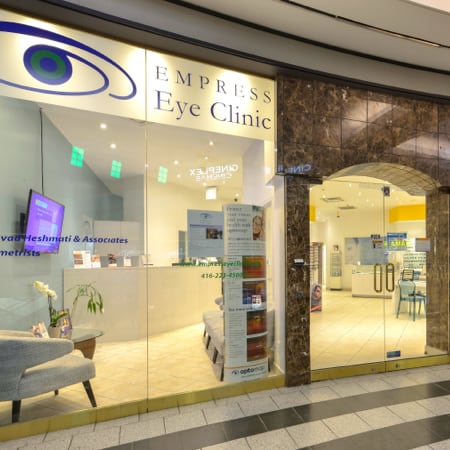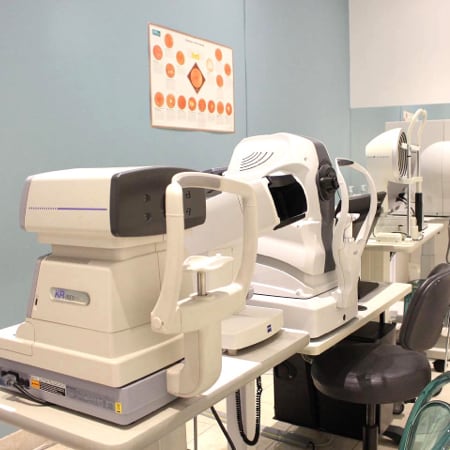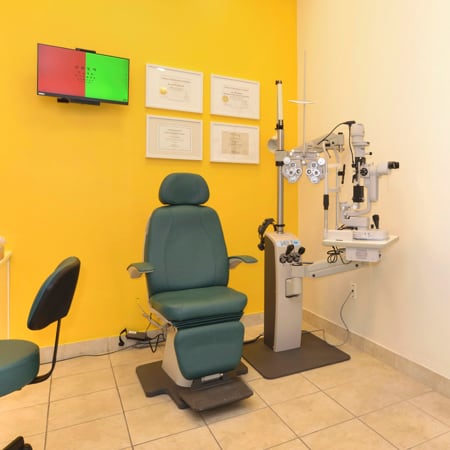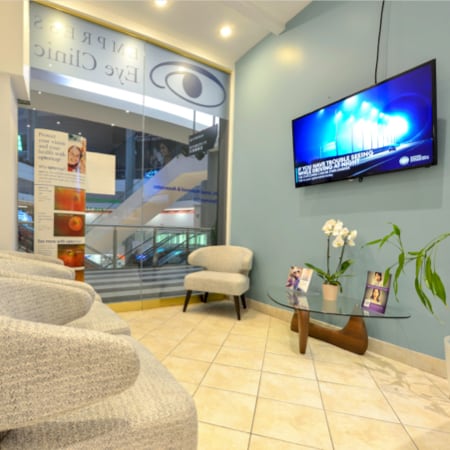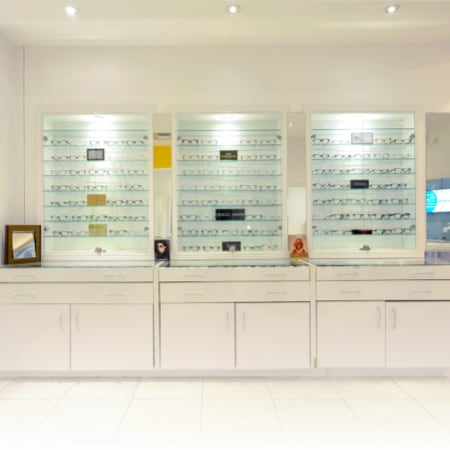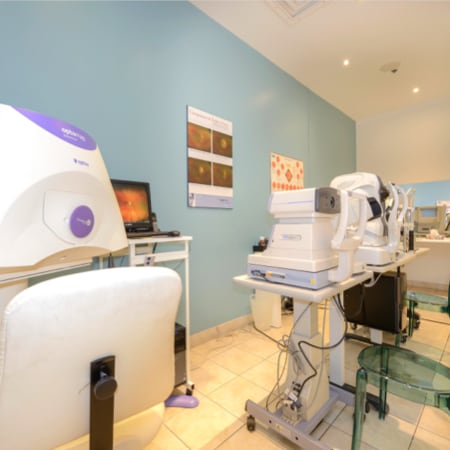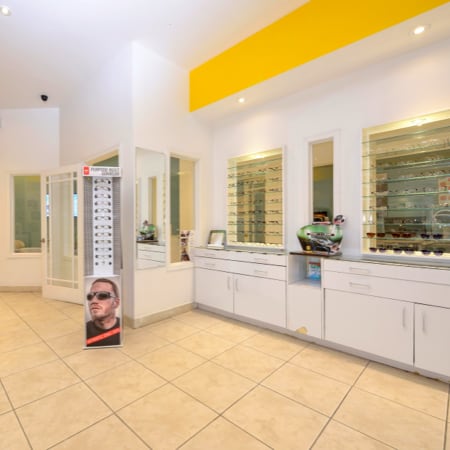Get the Dry Eye Relief You Deserve
Empress Eye Clinic is an advanced dry eye clinic located in North York, Toronto. It provides a personalized approach to dry eye diagnosis and therapy by leveraging the diagnostic tests, including the osmolarity test. The advanced diagnostic imaging technology includes a combination of interferometry and NIKTBUT (None Invasive Keratograph Tear Break Up Time), Meibography and Redness Scan.
After proper diagnosis, the initiation of treatment becomes essential. The treatment choice for dry eye depends on its severity and underlying cause. Treatment options may encompass one or a combination of the following approaches:
- Antibiotics
- Steroid eye drops
- Lubricating eye drops and ointments
- Autologous serum
- Warm compress therapy
- Blinking exercises
- Cyclosporine eye drops
- Lifitegrast
- Omega-3 supplements
- Punctal plugs
- Probing
- Scleral contact lenses
- Amniotic membrane transplant
- ILux device treatments
- Treating the underlying systemic disease
In the cases where Meibomian Gland Dysfunction (MGD) stands out as the primary cause of dry eye, At Empress Eye Clinic, we incorporate the ILux Device to express the meibomian glands, facilitating the smooth flow of lipid(meibum). This treatment is characterized by its efficiency and precision, precisely targeting the areas requiring intervention in dry eye therapy.
The iLUX device’s unique capability to use light to apply controlled heat and pressure therapy directly to the meibomian glands helps alleviate dry eye symptoms by improving gland function and tear film stability. This quick and comfortable procedure, taking just about 8-12 minutes per eye, can significantly enhance the quality of life for individuals suffering from dry eye discomfort, with improvements noticeable in as little as one week. This state-of-the-art treatment is fully approved by the FDA and Health Canada, ensuring our patients’ highest safety and efficacy standards.
A clinical study, subject to FDA scrutiny, demonstrated a significant enhancement in patient ocular surface disease index scores, which assess the severity of dry eye symptoms. The analysis consistently revealed marked improvements in patients’ pain and discomfort levels, visual acuity, and meibomian gland quality
Our commitment to utilizing cutting-edge technology underscores our dedication to providing the highest level of eye care.
Empress Eye Clinic’s expert team is ready to deliver the latest practical, efficient treatment options for those seeking relief from persistent dry eye discomfort. Discover how our dry eye therapy can make a difference in your eye health and comfort by scheduling a consultation with us today.
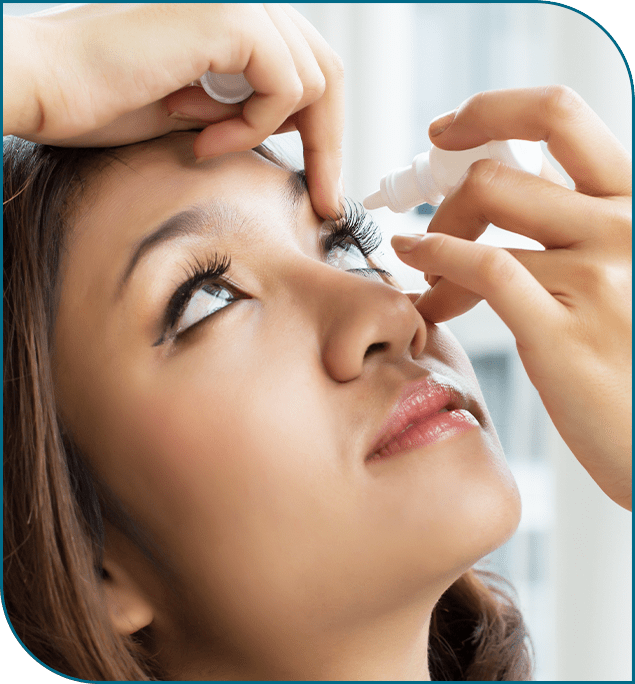
What is Dry Eye Syndrome?
Dry eye syndrome is caused by a lack of lubrication and moisture on the eye’s surface. This happens when there is an issue with any of the 3 components that make up our tears:
- An oily layer produced by the meibomian glands
- A watery (aqueous) layer produced by the lacrimal glands
- A mucous layer produced in the conjunctiva of the eye
Each component of the tear film serves an essential purpose in making sure our eyes stay healthy and seeing well.
The Types of Dry Eye
There are 2 types of dry eye:
- Evaporative dry eye occurs when there is a lack of the mucous layer in your tears, causing your tears to evaporate too quickly, drying your eyes out.
- Aqueous tear-deficient dry eye occurs when there isn’t enough of the aqueous layer in the tear film, stopping your eyes from producing enough tears to keep your eyes moist.
Causes & Symptoms of Dry Eye
Causes
A variety of factors can cause dry eyes. Some of the many potential causes of dry eyes include:
- Prolonged computer use
- Poorly fitted contact lenses
- Aging
- Certain medications such as antihistamines
- Dry or windy environments
- Smoking
- Health conditions such as Sjögren’s syndrome, rheumatoid arthritis, and meibomian gland dysfunction
- Eye surgeries
- Allergies
Symptoms
Symptoms of dry eye include:
- Burning, aching, dry, or itchy eyes
- Fatigued eyes
- Eye redness
- Photophobia (light sensitivity)
- A gritty feeling in your eye
- Blurred vision
- Difficulty with vision, especially at night
- Abnormally watery eyes
- Discomfort when wearing contact lenses

Dry Eye Therapy at Empress Eye Clinic
At Empress Eye Clinic, we go above and beyond when it comes to dry eye therapy. We strive to provide treatments that are quick, long-lasting, and effective. That’s why we offer the following treatments:
- Artificial tears, prescription eye drops, and autologous serums
- Natural therapies such as omega-3 supplements, warm compresses, and blinking exercises
- Medical procedures such as eye inserts, punctual plugs, amniotic membrane transplants, or ILux device treatments
- Specialty contacts such as scleral lenses
Say Goodbye to Dry Eyes
You don’t have to live with dry eyes anymore. See what Empress Eye Clinic can do for you!
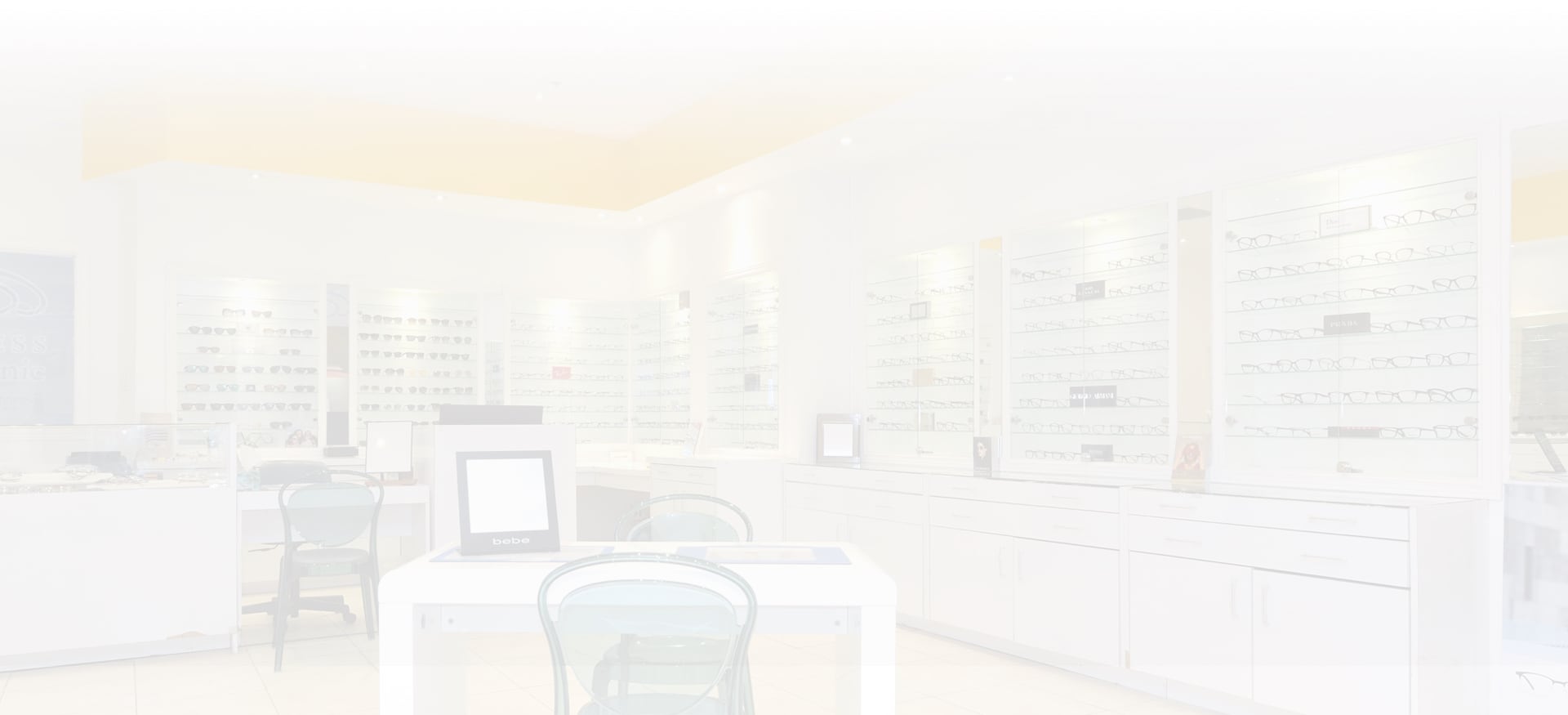
Our Location
Empress Eye Clinic
5095 Yonge Street, Unit B6
North York, Ontario
M2N 6Z4
Located at Empress Walk Mall at the corner of Yonge and Empress Avenue. Near Yonge and Sheppard and Yonge and Finch. We serve patients from North York, Willowdale, Thornhill, Richmond Hill, Bayview Village, Markham, Yonge- Eglinton, Lawrence Park, York Mills, and the Greater Toronto Area (GTA)
Our office is directly accessible by the Yonge-University Subway from North York Subway Station. It is also easily accessible by vehicle from Hwy 401
Address
- 5095 Yonge Street Unit B6
- North York, ON M2N 6Z4
Contact Information
- Phone: 416-223-4500
- Fax: 647-343-0347
- Email: [email protected]
Hours of Operation
- Monday: 10:00 AM – 7:00 PM
- Tuesday: 11:00 AM – 7:00 PM
- Wednesday: 10:00 AM – 7:00 PM
- Thursday: 10:00 AM – 6:00 PM
- Friday: 10:00 AM – 7:00 PM
- Saturday: 10:00 AM – 5:00 PM
- Sunday: Closed
Some of Our Services
Ask Us About Direct Insurance Billing
Our Brands
